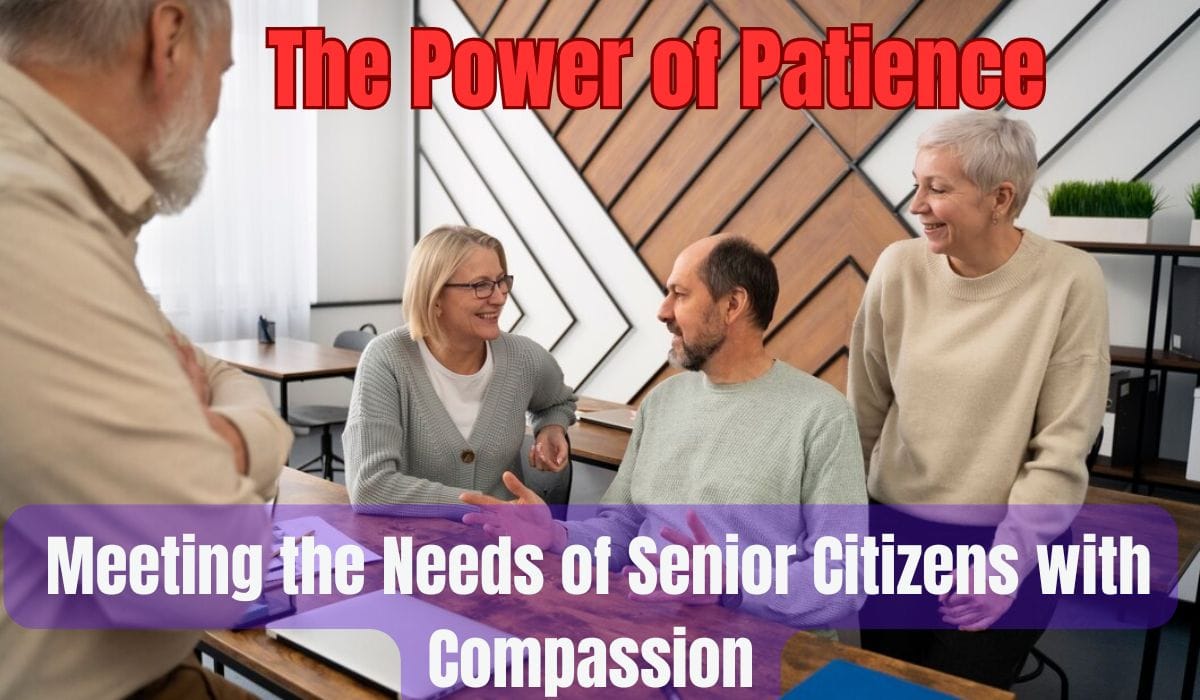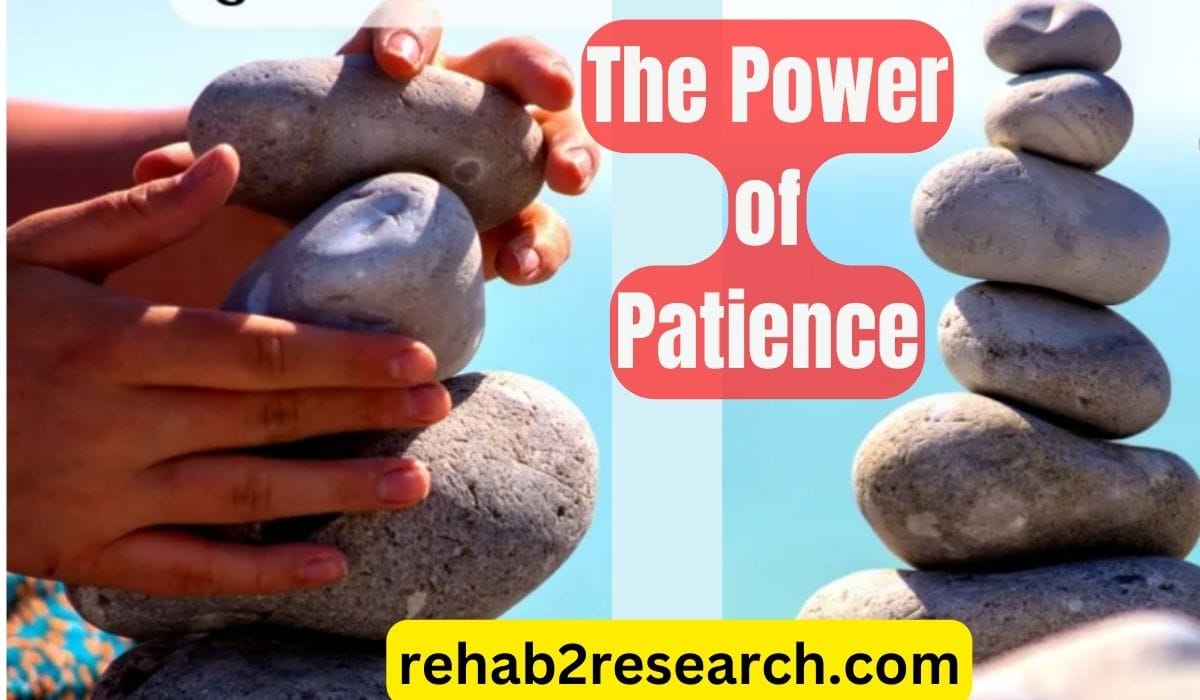The Power of Patience: Meeting the Needs of Senior Citizens with Compassion, Aging is a natural phase of life that brings unique challenges, including physical limitations, emotional adjustments, and evolving social dynamics. For senior citizens, patience is not just a virtue—it’s a necessity for the people around them. Showing patience and compassion helps create an environment where they feel valued, respected, and supported. This article explores the importance of patience in meeting the needs of senior citizens and provides actionable insights for caregivers, family members, and society as a whole.
What is patience
Patience is the ability to endure difficult circumstances, delays, or challenges without becoming frustrated, upset, or reactive. It involves maintaining calmness, self-control, and perseverance, even in situations that test one’s tolerance or emotional stability. Patience reflects emotional resilience and a willingness to accept things as they are while working toward solutions or outcomes over time.
Key Aspects of Patience
- Tolerance for Delay: The capacity to wait for something without undue anxiety or irritation.
- Emotional Regulation: The ability to manage emotions, especially frustration or anger, in challenging situations.
- Perseverance: Staying committed to a task or goal despite obstacles or slow progress.
- Empathy and Understanding: Recognizing that others may have different needs, perspectives, or paces, and allowing them the time and space they require.
Patience is often considered both a virtue and a skill that can be cultivated over time through mindfulness, self-awareness, and intentional practice.
Why Patience is Essential for Human Life
Patience is one of the most valuable virtues in human life. It is the ability to remain calm and composed in the face of challenges, delays, or adversity. While often overlooked, patience plays a crucial role in fostering personal growth, building meaningful relationships, and achieving long-term success. Here are some compelling reasons why patience is a necessity for a fulfilling and balanced life.
1. Enhances Emotional Well-Being
Patience helps individuals manage stress and frustration effectively. It allows people to approach situations with a calm mindset, reducing anxiety and preventing impulsive reactions. When we cultivate patience, we develop emotional resilience, which is vital for navigating life’s ups and downs.
2. Promotes Better Decision-Making
Impatience often leads to hasty decisions, which can have negative consequences. Patience gives us the time to evaluate options, consider outcomes, and make thoughtful choices. Whether in personal relationships or professional settings, patience ensures that decisions are made with clarity and foresight.
3. Strengthens Relationships
Relationships thrive on understanding, empathy, and tolerance—all of which require patience. By being patient with others, we create an environment of trust and respect. This is especially important in resolving conflicts, supporting loved ones, and fostering meaningful connections.
4. Builds Perseverance and Success
Achieving meaningful goals takes time, effort, and persistence. Patience empowers individuals to stay committed to their ambitions, even when progress is slow or obstacles arise. It is a key ingredient in turning dreams into reality, as it fosters determination and grit.
5. Encourages Personal Growth
Personal growth is a lifelong journey that demands patience. Learning new skills, breaking bad habits, or overcoming setbacks takes time and effort. Patience helps us stay focused on our development without becoming discouraged by temporary failures.
6. Reduces Conflict and Misunderstanding
Impatience can escalate tensions and lead to misunderstandings in social interactions. On the other hand, patience allows us to listen actively, understand others’ perspectives, and respond thoughtfully. This reduces conflicts and promotes harmony in both personal and professional relationships.
7. Fosters a Positive Mindset
A patient mindset allows individuals to appreciate the process rather than fixating solely on the outcome. This shift in focus helps to cultivate gratitude and a sense of fulfillment, even during challenging times.
8. Teaches Adaptability and Acceptance
Life is unpredictable, and not everything happens according to our plans. Patience teaches us to adapt to changes and accept situations that are beyond our control. This flexibility is crucial for maintaining peace of mind and moving forward in life.
The Power of Patience: Meeting the Needs of Senior Citizens with Compassion
The Unique Needs of Senior Citizens
As individuals age, their needs become more complex and multifaceted. Some of the key areas requiring attention include:
- Health Challenges: Seniors often deal with chronic illnesses, reduced mobility, or cognitive decline, which require consistent care and understanding.
- Emotional Well-being: Feelings of isolation, loss, or anxiety are common and necessitate a compassionate approach.
- Slower Pace: Seniors may require more time to process information, make decisions, or complete tasks, which calls for patience from those around them.
Meeting these needs demands not only practical support but also emotional sensitivity and the willingness to adapt.
The Role of Patience in Supporting Seniors
Patience acts as a bridge between understanding and action. Here’s why it’s crucial:
- Fostering Trust: Exhibiting patience signals that you value the individual and are willing to invest time in their well-being. This builds trust and strengthens relationships.
- Reducing Stress: Seniors often feel overwhelmed when rushed. Patience helps create a calming atmosphere, reducing their anxiety.
- Encouraging Independence: By allowing seniors to perform tasks at their own pace, you empower them and preserve their sense of autonomy.

Practical Ways to Cultivate Patience and Compassion
1. Practice Active Listening
When communicating with seniors, listen without interrupting. Give them time to express themselves fully, even if it takes longer than expected. Maintain eye contact and show genuine interest in what they’re saying.
2. Adapt to Their Pace
Be mindful of their slower movement or thought processes. Avoid pressuring them to hurry. Instead, plan activities with ample time to accommodate their needs.
3. Acknowledge Their Feelings
Seniors may express frustration or sadness about their limitations or losses. Validate their emotions by saying, “I understand this must be difficult for you,” rather than dismissing their concerns.
4. Focus on Positive Communication
Choose words and tones that convey respect and kindness. Avoid using condescending language or raising your voice, even if they struggle to hear or understand.
5. Educate Yourself
Learn about aging-related conditions such as dementia or arthritis. Understanding their challenges will help you respond with empathy and patience.
6. Take Care of Yourself
Caring for seniors can be emotionally demanding. Prioritize self-care to manage stress and maintain your capacity for patience. Regular breaks, mindfulness practices, and seeking support from others can help.
The Ripple Effect of Patience
Patience has a profound impact not only on seniors but also on caregivers and family members. A patient approach:
- Improves Relationships: Patience nurtures deeper connections, fostering mutual respect and love.
- Enhances Quality of Life: Seniors who feel understood and cared for are more likely to thrive emotionally and physically.
- Sets an Example: Your patience can inspire others to treat seniors with the same level of compassion.
Conclusion: The Power of Patience
Meeting the needs of senior citizens goes beyond addressing their physical and emotional needs—it requires patience, empathy, and genuine compassion. By practicing patience, we enhance their quality of life and deepen our sense of fulfillment. Aging is a universal journey, and the kindness we extend today sets the foundation for a more compassionate future for generations to come.
Patience is more than an action; it’s a heartfelt gift that communicates, “You matter, and I value you.” Let us offer this gift freely to the seniors in our lives. It serves as a cornerstone for a balanced and meaningful existence, allowing us to face challenges with grace, nurture stronger relationships, and accomplish our aspirations with persistence.
In a fast-paced world that prioritizes instant results, patience encourages us to slow down, savor the journey, and recognize the beauty of growth. By cultivating this virtue, we unlock the ability to lead a richer, more harmonious, and successful life. Patience isn’t just a virtue—it’s a transformative force that shapes our experiences and interactions with others.




